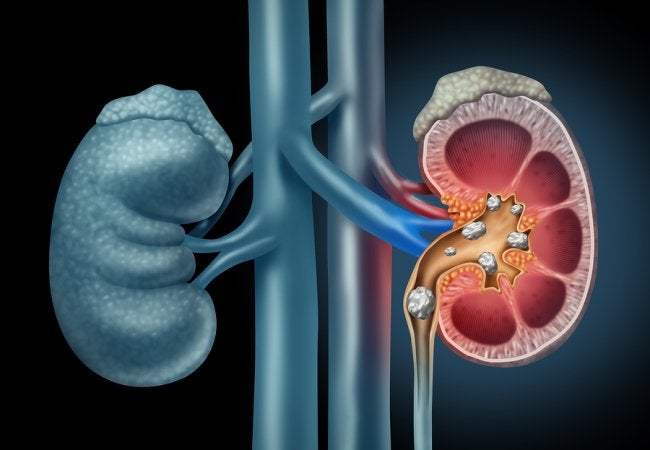-
Neurogenic Bladder: Making Sense of a Complex Disorder

Neurogenic bladder occurs when the nerves that control bladder function don’t work properly. Depending on how the nerves are affected, patients with neurogenic bladder may experience overactive or underactive bladders. Because neurogenic bladder is so complicated, it’s important for patients to receive treatment from a urologist with experience with the condition. If you have been diagnosed with a neurogenic bladder or suspect you are having symptoms that could be caused by the condition, here are the facts you need to know.
Neurogenic bladder is usually caused by other medical conditions.
There are several conditions that increase the risk of developing neurogenic bladder , including:
- Stroke
- Spinal cord injuries
- Parkinson’s disease
- Traumatic brain injuries
- Congenital birth defects that affect the spine
- Multiple sclerosis
Anything that damages the nerves that help to control the bladder or that interferes with the communication between those nerves and the brain can lead to neurogenic bladder.
Both overactive and underactive bladder symptoms are possible.
In some people with neurogenic bladders, the nerves cause the bladder to squeeze more often than normal, causing urge incontinence. In other instances, the nerves may become underactive, which causes urine to build up and eventually leak. Some people experience both overactive and underactive bladder symptoms. Neurogenic bladder also often causes an increase in urinary tract infections.
Multiple treatments are available.
Neurogenic bladder can cause anxiety and depression for sufferers, who worry about the impacts of incontinence on their everyday activities. Fortunately, there are many treatment options available. An experienced neurologist can help sufferers from the right combination of lifestyle changes and medications to get relief. Surgical treatment is also helpful for people with severe symptoms.
At Urology Associates, P.C., our urologists offer both non-invasive and surgical treatments for a range of urological conditions, including extensive treatments for incontinence throughout Tennessee. For more information or to make an appointment, call (855) 901-1338.
-
Causes and Risk Factors of Premature Ejaculation

Premature ejaculation happens to as many as one in three men at some point in their lives. It occurs when a man ejaculates sooner than he would prefer during intercourse, and in many cases, it happens only sporadically and infrequently. For other men, however, premature ejaculation is an ongoing issue that interferes with a healthy sex life. Men who experience this sexual health issue don’t have to simply live with it. Treatments are available that can help delay ejaculation. If you see a urologist for this type of sexual dysfunction , he or she will try to determine the cause in order to settle on the right treatment approach. Here is a look at some of the common causes of—and risk factors for—premature ejaculation.
Psychological Factors
Psychological factors can play a central role in persistent premature ejaculation. In some cases, men who have experienced premature ejaculation in the past and worry about it happening again can actually increase the risk of it occurring because of their anxiety. Other psychological factors can also play a role, including:
- Relationship problems
- Poor body image
- History of sexual abuse
- History of erectile dysfunction
All of these factors can cause men to rush through sexual encounters or become anxious during them, which increases the chances that premature ejaculation will occur.
Biological Factors
Biological factors can lead to premature ejaculation on their own, or they may appear alongside psychological factors, exacerbating them. Some of the biological factors that increase the risk of premature ejaculation include:
- Abnormal hormone levels
- Abnormal neurotransmitter levels
- Inflammation of the prostate or urethra
- Infection of the prostate or urethra
- Inherited traits that cause physical abnormalities
Premature ejaculation can cause stress and self-esteem issues and may interfere with fertility. Don’t suffer in silence when it happens to you. The doctors at Urology Associates, P.C. are experienced in treating sexual health problems through our Men’s Health Clinic in Nashville. Call us today at (855) 901-1338 to make an appointment.
-
How Your Brain and Bladder Work Together

If you’ve made an appointment with a urologist to talk about a urinary problem, such as incontinence, it can be helpful to know how your body works. Your urinary system is made up of organs and structures, such as the bladder, kidneys, ureters, and urethra. But the brain also has an important role to play.
As your kidneys process the blood, they remove waste products and produce urine. The urine is sent to the bladder for temporary storage. As your bladder fills up, it sends a signal to your brain. This lets you feel the need to urinate. When you’re ready to urinate, your brain sends a signal via the nerves to the bladder muscles. The muscles contract the bladder, which forces the urine out into the urethra. The urethra is the small tube that allows urine to exit the body.
At Urology Associates, P.C., our urologists in Nashville are courteous, compassionate professionals who work closely with each patient to improve their health and quality of life. Call (855) 901-1338 to request a confidential consultation.
-
FAQs and Answers About Urethral Strictures

The urethra’s job is to transport urine from the bladder out of the body. Sometimes, this small tube becomes even more narrow than usual. This condition is called a urethral stricture . Urethral strictures can cause uncomfortable symptoms, and may lead to additional medical complications if left untreated. Because of this, it’s recommended that patients seek a referral to a urologist for specialized treatment.
Do women ever get urethral strictures?
It’s possible, but rare. They almost always affect men because men have a longer urethra . This means there are more opportunities for the urethra to be affected by injuries or disease.
What causes urethral strictures?
Occasionally, urologists are unable to determine the cause. Some of the most common causes include:
- Trauma to the urethra (such as from a fall)
- Infection in the area (including sexually transmitted diseases)
- Surgery to remove kidney stones
- Use of a urinary catheter
- Radiation therapy to the area
- Benign prostatic hyperplasia (BPH)
- Surgery for an enlarged prostate
Any condition or injury that can cause swelling and scarring of the urethra may cause it to narrow. This is why the doctor will ask about your prior history of surgeries. If you’ve ever had an endoscope or other instrument inserted into the urethra, there’s always a possibility that it can cause scarring.
What are the symptoms of urethral strictures?
Initially, patients will primarily notice problems with urinary flow, including the following:
- Incomplete bladder emptying
- Decreased urine stream
- Spraying or sputtering of the urine stream
Some patients may also experience pain during urination. If the urethral stricture isn’t treated and it causes additional damage, such as damage to the kidneys, patients may experience bloody or dark urine, bloody semen, urethral leaking, and abdominal pain. Urinary tract infections (UTIs) may occur frequently, along with urinary incontinence and swelling of the penis.
Have you been diagnosed with urethral strictures? Find the expert care you need at Urology Associates, P.C. Call us today at (855) 901-1338 to request our next available appointment with a urologist in Tennessee.
-
Treating Fecal Incontinence

Millions of Americans suffer from fecal incontinence . This urologic condition can be a humiliating experience for patients when it happens in public places. Remember that it’s a medical problem—not a character flaw. If you’ve ever lost bowel control, visit a urologist right away to get the medical treatment you need to regain your dignity and health. Your treatment plan will depend on the underlying cause of your condition.
Dietary Modifications
Fecal incontinence can be caused by constipation or diarrhea. If you’re experiencing diarrhea, your doctor can offer guidance on adding high-fiber foods to your diet. A fiber supplement might also be a good idea. If the problem is constipation, your doctor may recommend increasing your intake of water, as well as eating more high-fiber foods.
Medications
Medications can be another strategy for treating fecal incontinence caused by constipation or diarrhea. Patients with chronic constipation may be prescribed a bulk laxative or an injectable bulking agent. Otherwise, an anti-diarrheal drug can help.
Therapies
Before considering a surgical option, your doctor will likely recommend a therapeutic treatment to improve your control of the anal sphincter . One example is the use of biofeedback, which can help you learn how to strengthen the anal muscles and pelvic floor muscles. You’ll also increase your awareness of the urge to defecate, and work on contracting the muscles if you aren’t ready to defecate. Bowel training is another therapy that may be helpful. It involves getting on a defecation schedule to help you better control your bowel movements. If neither of those options has been helpful for you, your doctor may recommend surgery.
Surgeries
Surgery can help patients who suffer from fecal incontinence due to an underlying structural problem. In other words, if the cause is a damaged anal sphincter, the urologist can perform a sphincteroplasty to strengthen the muscle. Sometimes, a muscle from the inner thigh may be grafted to the area to improve control.
Fecal incontinence is one of the many conditions we can treat here at Urology Associates, P.C. We understand the limitations that incontinence can place on our patients in Tennessee, and we want to help you reclaim your quality of life. Call us today at (855) 901-1338.
-
Are There Any Possible Complications of BPH?

Benign prostatic hyperplasia (BPH), also called an enlarged prostate, is one of the most common reasons why men over the age of 50 visit a urology specialist. Most men who develop BPH won’t develop complications from it, although they’re likely to have symptoms like frequent or urgent urination. It is possible for the enlarged prostate to cause the complete blockage of the urethra. When this happens, men are unable to urinate at all. This condition is called acute urinary retention, and it requires immediate medical attention.
Other possible complications of BPH include chronic, partial urinary retention, blood in the urine, and frequent urinary tract infections (UTIs). Some men may even develop bladder stones, bladder damage, or kidney stones. The proper treatment for BPH can help men control this condition and reduce the risk of complications.
Men with prostate problems in Tennessee can find the expert care they need for BPH at Urology Associates, P.C. Give us a call today at (855) 901-1338 to request our next available appointment.
-
The Circumcision Decision: Factors for New Parents to Consider

Circumcision is considered by many parents to be a routine procedure for newborn boys, even though it’s usually not medically necessary. For some parents, the choice to circumcise or not is clear, as it’s dictated by religious beliefs. Other parents may wish to speak with a urologist about this decision.
Penile Conditions
Circumcision prevents some medical conditions of the penis, including phimosis. Phimosis is the inability to retract the foreskin. However, it cannot be diagnosed until the boy has reached his first birthday, as most boys are born with the inability to retract the foreskin. Paraphimosis is another condition that is treatable or preventable with circumcision. It is the inability to return the retracted foreskin to the usual position. Untreated paraphimosis can cause blood accumulation, swelling, and severe pain. Although circumcision eliminates the risk of certain problems of the foreskin, it may increase the risk of other health issues. Meatitis is the inflammation of the opening in the penis, and it’s more common among circumcised boys.
Personal Hygiene
Religious and cultural preferences aside, some new parents opt for circumcision simply because it improves cleanliness. Until the boy is old enough to perform this task, the parents must retract the foreskin to clean the penis thoroughly. Once the boy is old enough, he must be relied upon to take care of this task himself, and not all children are known for their diligence.
Urinary Tract Infections (UTIs)
Urologists have found that boys who were circumcised as newborns are far less likely to require UTI treatment compared to uncircumcised boys. New parents who decide not to circumcise their infant do have the option of scheduling a circumcision later if the boy shows a tendency to develop UTIs .
Urologists might recommend this procedure for previously uncircumcised men who experience recurrent medical problems because of the presence of the foreskin. When you become a patient at Urology Associates, P.C., you’ll receive the in-depth guidance you need to make an informed decision. Call any of our twelve offices in Tennessee at (855) 901-1338.
-
Surgical Birth Control for Men
Male birth control is gradually becoming more commonplace. One option is a vasectomy, which is a surgery that a urology specialist can perform. The results should be considered permanent, although a reversal can be successful. When you watch this video, you’ll get some quick facts about vasectomies.
This video explains what happens during the procedure, which can be performed on an outpatient basis at a urology clinic. Afterward, men are advised to wear a jock strap for support, apply ice packs for 20 minutes at a time, and get plenty of rest while they recover.
Vasectomies and vasectomy reversals are two of the many procedures that urologists in Nashville can perform. If you’d like to schedule a Vasectomy consultation with one of our specialists, you can call Urology Associates, P.C. at (855) 901-1338.
-
Don’t Fall for These Myths About Kidney Stones

The minerals and salts in a person’s urine can sometimes crystallize and clump together, forming a kidney stone. Urologists sort kidney stones into categories. Most of them are calcium stones. The other types include struvite, uric acid, and cysteine stones. Regardless of the type of stone you have, there’s no question that this problem can cause excruciating pain. The pain can be enough to drive some patients to try folk remedies, even though the treatment administered by a urologist is proven effective.
Myth: Kidney stone patients should decrease calcium intake.
Calcium is found in the majority of all kidney stones, but urologists do not recommend reducing your calcium intake to prevent them. In fact, some research suggests that lowering your calcium intake may increase your risk of getting kidney stones. Usually, these stones are made from calcium oxalate. Metabolic disorders and intestinal bypass surgery may increase the concentration of calcium oxalate in the urine. Other stones are made from calcium phosphate. Metabolic conditions, such as renal tubular acidosis, can contribute to calcium phosphate stone development. People who get migraines or have seizure disorders may also be more likely to develop these stones.
Myth: Once I’ve had kidney stones, I’m not likely to get them again.
Unfortunately, people who have had kidney stones once are indeed at a higher risk of getting them again. Your urologist can help you learn how to reduce your risk. The following steps can help:
- Drink more water
- Maintain a healthy body weight
- Follow a low-sodium diet
Myth: Drinking olive oil will help pass a stone.
You may have heard that drinking olive oil and lemon juice will help your kidney stone pass faster and with less pain. It’s thought that olive oil can serve as a lubricant. There’s no research to substantiate this folk remedy. However, there are medications that can help you pass the stone, or your urologist may recommend surgical intervention.
Here at Urology Associates, P.C., we understand how painful and uncomfortable kidney stones are. Our urology team in Nashville administers effective treatments with a patient-focused, compassionate approach. Call us at (855) 901-1338 today, and we’ll get you in as soon as possible.
-
Prostate Biopsies 101

A biopsy is the extraction of a small sample of tissue from within the body. This is done in order to test the tissue in a lab for signs of problems like prostate cancer. A prostate biopsy is generally not the first diagnostic test a urologist will recommend. First, the urology specialist may recommend blood tests and a urinalysis. If abnormalities are present, the doctor may perform a transrectal ultrasound with a biopsy.
This involves inserting a very small ultrasound transducer into the rectum. This allows the doctor to view ultrasound images of the prostate in real time. Then, a small needle is used to extract tissue from the site of the suspected tumor. In the lab, a pathologist studies the tissue to confirm the diagnosis. To help the patient stay comfortable during this procedure, the doctor can administer local anesthesia and a light sedative. If sedation is used, the patient will need someone else to take him home afterward.
Specialized prostate cancer care is available throughout Tennessee at Urology Associates, P.C. Call (855) 901-1338, and we’ll walk you through every step of the process—from diagnosis to treatment to follow-up.
Recent Posts
categories
- Uncategorized
- Bladder Cancer
- Women's Sexual Health
- MonaLisa Touch
- Urology
- Urologist
- Erectile Dysfunction
- Kidney Cancer
- Incontinence
- Prostate
- MonaLisa Touch Laser Treatment
- Kidney Stones
- Urinary Tract Infections
- Event
- Sexual Dysfunction
- Testicular Cancer
- Prostate Cancer
- Urology Surgery Center
- urinary incontinence
- vaginismus
- noncoital pain disorder
- Hypoactive Sexual Desire Disorder
- Infographic
- provenge
- Xofigo
- robotic surgery
- hormone replacement
- diabetes
- renal cell carcinoma
- pelvic pain
- hematuria
- sexual health
- chronic testicular pain
- premature ejaculation
- Men's Health Clinic
- Dr. Melvin Seard
- Interstitial Cystitis
- vasectomy
- overactive bladder
- vaginal atrophy
- nocturia
- bladder infections
- urethral strictures
- Acute Epididymitis
- low sex drive
- circumcision
- pelvic floor dysfunction
- Peyronie's Disease
- prostatitis
- female sexual dysfunction
- varicocele
- difficult urination
- low libido
- PSA levels
- male fertility
- penile prosthesis
- prostatic intraepithelial neoplasia
- male infertility
- estrogen levels
- nurse navigator
- stress urinary incontinence
- vaginal yeast infection
- elevated psa
- painful sex
- adult circumcision
- epididymitis
- OAB
- kidney infection
- penile cancer
- pelvic organ prolapse
- Vasectomy Reversal
- bone health
- cystectomies
- clinical trials
- bloody urine
- Advanced Therapeutic Center
- WISH MedSpa
- neurogenic bladder
- WISH Team
- prostate biopsies
- BPH
- fecal incontinence
- lithotripsy
- osteoporosis
- kidney cysts
